Delta-8-tetrahydrocannabinol (Δ8-THC) is a psychoactive cannabinoid similar to the more familiar Delta-9-tetrahydrocannabinol (Δ9-THC), the well-known psychoactive ingredient in cannabis. After the 2018 U.S. Farm Bill legalized hemp, Delta-8-THC products (made from hemp-derived cannabidiol) surged in popularity. [1]
Consumers and employers alike now ask: Will Delta-8 show up on a drug test? In short, yes—most standard THC screens cannot tell the difference.
- Urine immunoassays cross-react with Delta-8-THC and its metabolites, so using Δ8 can give a positive THC result.
- Delta-8 is metabolized into Delta-8-THC-COOH, which can stay in your system for days or even weeks.
- Even if Delta-8-THC is legal where you live, a positive test is treated like any cannabis use. The FDA warns that Delta-8 products are unregulated, with unknown safety and varying strengths.

Does Delta-8 show up on drug tests?
Yes. Standard drug tests screen for THC metabolites and do not distinguish between Delta-8 and Delta-9. Most workplace or clinical urine screens use immunoassay kits designed to detect the primary inactive THC metabolite, 11-nor-9-carboxy-Δ9-tetrahydrocannabinol (THC-COOH). [2]
Because Delta-8-THC is structurally very similar to Delta-9-THC, these immunoassays often cross-react with Delta-8-THC and its metabolites. A 2023 study found that all six major commercial urine immunoassay kits tested yielded positive results for Delta-8-THC in the same manner as they do for Delta-9-THC. [2]
In other words, if you use Delta-8-THC, a routine urine drug screen will very likely yield a positive result for THC.
A positive screen will typically be followed by a confirmatory test using gas chromatography-mass spectrometry(GC-MS) or liquid chromatography-mass spectrometry (LC-MS). These methods can distinguish between Delta-8 and Delta-9 metabolites, although not all labs report them separately. If confirmed, some labs may simply report the presence of THC-COOH or Delta-8-THC-COOH, depending on their reporting practices. [3]
The presence of any carboxy-THC metabolite (whether from Delta-8 or Delta-9) is generally interpreted as evidence of cannabis use. [3]
Delta-8 vs. Delta-9: Why tests can't distinguish between them
Delta-8 THC and Delta-9 THC differ only slightly—their double bond appears in a different spot on the molecule. Despite this, the body breaks them down into similar metabolites, especially THC-COOH, which is what most drug tests look for. [1][2]
Because of this, routine urine drug tests can’t tell the difference. Both forms of THC trigger the same positive result. Even though confirmatory lab tests can detect the difference, most don’t report which type of THC was used. [3]
How long does Delta-8 stay in your system?
Scientific data on the elimination of Delta-8-THC in humans is limited. However, because Delta-8 and Delta-9-THC are structurally similar, we can infer timelines from known Delta-9 metabolism studies. Both compounds are lipophilic, meaning they’re stored in fat tissue and gradually released into the bloodstream. After consumption, Delta-8 is metabolized in the liver to 11-hydroxy-Δ8-THC, and then to 11-nor-9-carboxy-delta-8-THC (Δ8-THC-COOH)—the inactive metabolite typically detected in urine.
This metabolite can remain detectable for days to weeks, depending on use patterns. For reference, a study on chronic Delta-9 users under abstinence found THC-COOH detectable in urine for up to 28 days. Below are the detection windows for Delta-9-THC. [3] [4] Because Delta-8 THC shares similar storage and metabolic traits, its elimination profile is likely comparable.
| Frequency of use | Delta-9 detection windows | Delta-8 detection windows |
|---|---|---|
| Occasional users | 1–7 days | May clear within a few days to a week |
| Frequent or heavy users | 30–60 days | Several weeks or more |
Higher body fat correlates with longer THC metabolite detection windows, as THC is fat-soluble and released slowly from adipose (fat) tissue. [4]
How long do the effects of Delta-8 last?
The acute effects of Delta-8-THC, which create the psychoactive “high,” are much shorter than its detection window in the body:
- Inhalation (vape or smoke): Effects begin within minutes, peak around 15–30 minutes, and typically last 2–4 hours.
- Ingestion (edibles/gummies): Onset is slower (30–90 minutes), with effects lasting 4–8 hours, sometimes longer.
Individual experiences of a Delta-8 high vary based on several factors:
- Dose
- Tolerance
- Metabolism
- Mode of consumption
However, drug tests detect Delta-8 THC metabolites, not the high itself. So, even after the effects have worn off, your body may still show evidence of use for several days or more.
Delta-8 detection times by test type
Detection windows vary by test type. While specific data on Delta-8 THC is limited, its profile is believed to be similar to Delta-9.
Urine
Urine drug tests are the most widely used detection method. The primary metabolite of Delta-8 THC (Δ8-THC-COOH) can stay in urine for several days to weeks, depending on the degree of use. With occasional use, urine drug tests detect Δ8-THC for up to several days. With frequent/heavy use, it may be detected for 30–60 days. [3]
Blood
Delta-8-THC is usually detectable for 12–48 hours after use. Heavy use may extend this slightly, but blood testing reflects recent use.
Saliva
THC may appear in saliva for 1–3 days, often only within the first 24 hours after smoking or vaping. Saliva tests are most effective for detecting recent use.
Hair
Hair tests can detect Delta-8 use for up to 90 days or more, as metabolites get deposited into hair shafts over time. This test is rarely used for routine screening, but it has the longest window overall.
Factors affecting detection time
Several factors impact Delta-8 THC detection time: [4]
- Frequency & dose: More frequent or heavier use leads to longer detection windows. Occasional users clear it faster.
- Body fat (BMI): Delta-8-THC is stored in fat. Higher body fat means longer retention.
- Metabolism: A faster metabolism and healthy liver and kidneys result in quicker clearance.
- Hydration & activity: These may help slightly, but the effects are minimal. Over-hydration can flag tests.
- Test sensitivity: Lower cutoff levels (e.g., 20 ng/mL) detect THC longer than the standard cutoff of 50 ng/mL.
No detox trick can beat time. Delta-8 THC clears when your body is ready; hydration and exercise may help, but only to a certain extent.
Risks and consequences of testing positive: Is Delta-8 legal?
Testing positive for THC can carry serious consequences, even if you used legal Delta-8. As mentioned, most routine drug tests don’t distinguish between Delta-8 and Delta-9. A positive result for THC metabolites (THC-COOH) is usually treated as cannabis use, regardless of source.
Employers, probation officers, and sports bodies typically don’t recognize Delta-8 as an exception. One lab states: “The presence of Delta-8 and/or Delta-9 THC-COOH in urine strongly indicates cannabis use.” [3]
Legal status
Delta-8’s legality is murky. The 2018 Farm Bill legalized hemp-derived compounds, but there are several caveats:
- The DEA considers synthetic Delta-8 a controlled substance.[5]
- Over a dozen states have banned or restricted it.[6]
- The FDA warns that Delta-8 products are unregulated and not approved for safe use.[7]
Even if Delta-8 THC is legal in your state, it can still make you fail a drug test. And that can mean job loss, legal consequences, or policy violations—especially in zero-tolerance environments.
How to approach testing if you've used Delta-8
Delta-8-THC can result in a positive test for THC, and most tests do not differentiate. If you’re facing a test, here are grounded, responsible steps:
- Accept the limits of testing. Even legal use can result in a positive (illegal) test. Most policies are based on presence, not source or intent.
- Know your rights and context. In some workplaces, legal or medical use may be disclosed. In other workplaces, any THC result may be a violation. Don’t assume exemptions apply—read the actual work policy or contract.
- Don't risk your health. Detox kits and online "cleanses" are unregulated and often dangerous. There is no quick, safe way to eliminate THC metabolites.
- Document medical or legal use if applicable. If your use was for a therapeutic reason, keep clear, dated records. But understand this may not carry legal weight.

-person-thumbnail.jpg?v=1758880627)
-guide-detail.jpg?v=1722513387)

